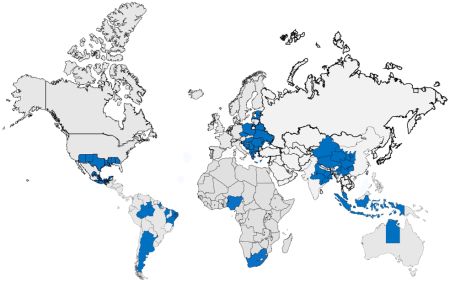Looking for $2 Trillion
The group of 20 (G20) finance ministers meeting in Australia has just announced an ambitious initiative to boost the world’s gross domestic product (GDP) by at least $2 trillion over the next five years. To achieve this target they propose to shape and implement new policies that increase investment and employment, and promote competition and trade.
So far there has been no mention of health as a means to promote economic development among the G20 nations, even though we learned more than a decade ago from the World Health Organization’s Report of the Commission on Macroeconomics and Health led by Jeffrey Sachs that diseases can actually cause poverty. Such findings provided the basis for which disease targets were added to the Millennium Development Goals.
In an analysis published last year in PLOS NTDs I found a surprising number of neglected tropical diseases (NTDs) – a group of 17 major chronic, debilitating, and mostly parasitic infections – among the poor living in G20 countries. Indeed most of the world’s cases of the worst NTDs (as measured in disability-adjusted life years) including Chagas disease, food-borne trematodiases, leishmaniasis, leprosy, lymphatic filariasis can be found G20 countries (together with Nigeria), as well as almost one-half of the hookworm cases. Based on additional new data coming out of Oxford University, many of the world’s dengue fever cases are also among the G20. So with the exception of a few NTDs such as African trypanosomiasis, onchocerciasis, and schistosomiasis, which are overwhelmingly sub-Saharan African diseases, the NTDs are mostly G20 problems. This includes the United States where I have found widespread NTDs in the midst of southern poverty.

So why should the G20 finance ministers care? We know that NTDs actually cause poverty because of their adverse effects on worker productivity, child development, and the health of girls and women. For example we found recently that Chagas disease, a parasitic disease of the heart, is widespread in the G20 countries of Argentina, Brazil, Mexico, US, and elsewhere in the Americas where it accounts for $7 billion in economic losses each year [8], while Lymphatic filariasis and hookworm, both widespread in the Asian G20 countries, cause massive economic losses through the mechanisms outlined above.
The NTD community of scientists and public health experts must do a better job at rigorously measuring the economic losses caused by our diseases, but the emerging message is becoming clear: NTDs are a stealth reason why more than 600 million people living below the World Bank poverty in G20 countries cannot escape poverty. I used the term “blue marble health” to describe a different global health framework of diseases of the poor living among the wealthy rather than the older one of developing versus developed countries.
In PLOS NTDs I previously stated “a substantial portion of the world’s NTDs, up to one-half, or more, in some cases, may be eliminated if each of the G20 countries would assume greater responsibility for their own NTD problem and expand their indigenous control and elimination efforts”. I’m now upping the ante and stating that doing so would simultaneously help the G20 finance ministers achieve their economic targets.
NTD control and elimination won’t be an easy sell to the G20 finance ministers, but it is an important message to send “down under” sometime before November of this year.
Peter Hotez MD PhD is Dean of the National School of Tropical Medicine at Baylor College of Medicine where he is also President of the Sabin Vaccine Institute, Texas Children’s Hospital Endowed Chair in Tropical Pediatrics. He is also Baker Institute Fellow in Disease and Poverty at Rice University
